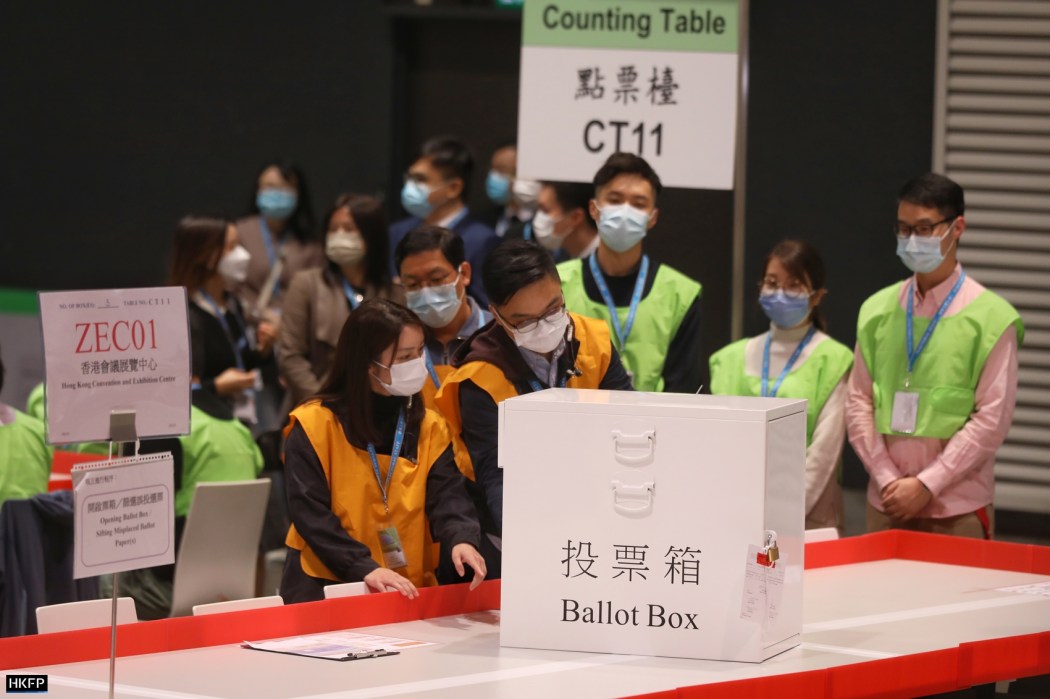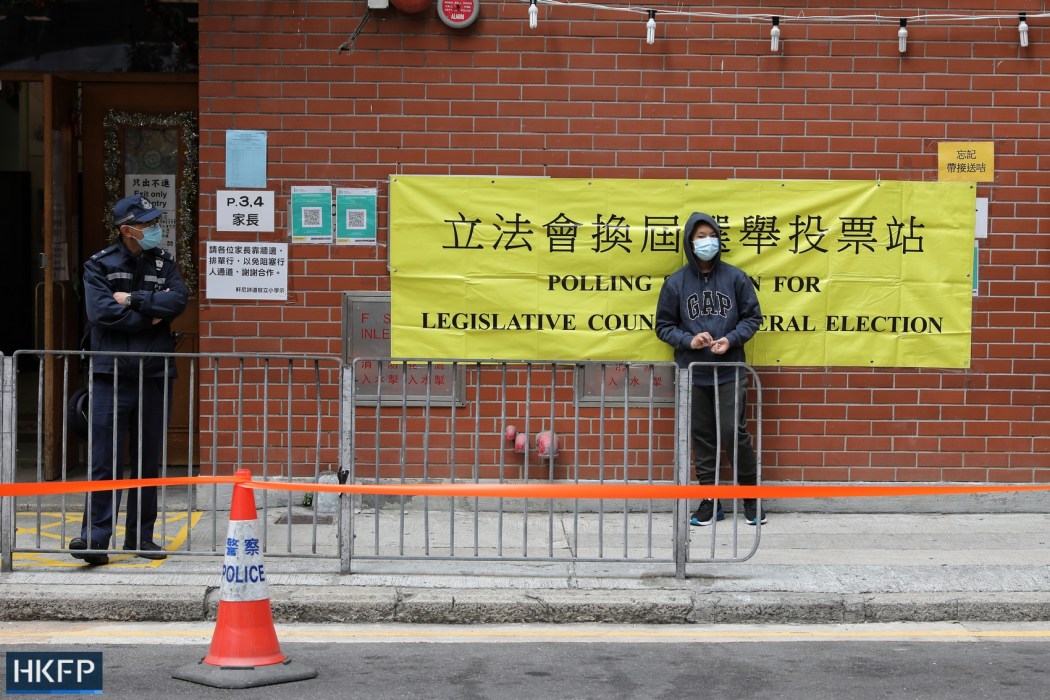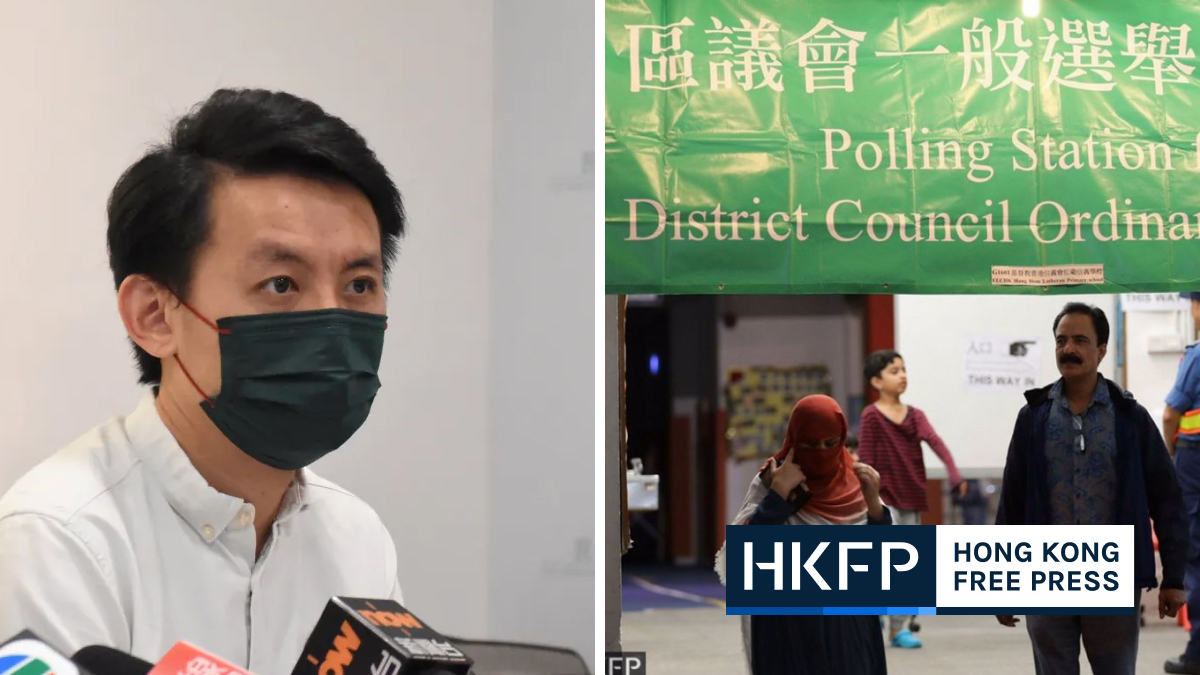Hong Kong’s first “patriots-only” Legislative Council (LegCo) election last December, held under a Beijing-mandated revamp of the electoral system that minimised the role of democrats, saw the lowest turnout in the city’s history.

In seven graphs, HKFP takes a detailed look at the participation rate and other aspects of the poll.
Low turnout rate among young people
The turnout of 30.2 per cent was down by half from the previous LegCo election in 2016. Young people in particular stayed away.
Among the 1.3 million voters who took part, just 6,269 first time voters – meaning people aged 18 to 20 – turned out to vote. That was just 6.69 per cent of the total number of registered electors in that age group.
Voting rates fell for all age groups, but the turnout for those aged 18 to 30 dropped the most drastically compared with the previous two elections, the 2016 LegCo election and the 2019 District Council election.
The district council election took place against the backdrop of months of protests against a proposed extradition bill, which began in June that year.
While the protesters initially demanded the withdrawal of the bill, calls for democracy and anger over Beijing’s encroachment into Hong Kong’s autonomy soon emerged in the sometimes violent rallies.
Demonstrators also demanded an independent probe into police conduct, amnesty for those arrested and a halt to the characterisation of the protests as “riots.”
But the pro-democracy camp, which swept the 2019 district elections with 388 out of 479 seats, was absent from the legislative race two years later.
The group initially aspired to win a majority in LegCo, and held a primary election in the hope of concentrating votes, before the government announced the postponement of the upcoming LegCo poll citing Covid-19 concerns in July 2020.
The following January, Hong Kong police began arresting those involved in the primary under a national security law imposed by Beijing in June 2020. By the time the LegCo polls were finally held last December, most prominent pro-democracy figures, including activists and former lawmakers, were either facing criminal charges, had fled the city or had given up politics.
Those who took part in the primary are still awaiting trial under the security legislation, which criminalised subversion, secession, collusion with foreign forces and terrorist acts.
Sweeping changes under Beijing’s electoral overhaul also reduced democratic representation in the legislature, tightened control of elections and introduced a pro-Beijing panel to vet candidates.

The percentage of directly elected seats was slashed from 50 per cent to around 22 per cent. Of the 35 candidates for the 20 seats in the 10 directly-elected geographical constituencies, 11 claimed to be “non-pro-establishment” but none were able to secure a seat.
Tik Chi-yuen, founder of centrist party Third Side and who ran in the social welfare sector, was the only self-proclaimed non-pro-establishment candidate to be elected in 2021 out of 90 legislators.
The number of newly registered voters also dropped significantly in 2021, with only 83,024 compared to 392,601 in 2019 and 407,450 in 2020.
Voter registration
While the number of eligible voters in the city rose from just over 3 million in 2000 to 4.47 million in 2021, the number of those aged 31 to 45 fell by over 14 percentage points, while the proportion of older voters aged 61 or above increased.
This partly reflects the city’s aging population, but could also suggest a declining interest in voting in recent years among younger people. The proportion of newly registered voters aged 30 or below fell below 25 per cent in 2020.
Voter turnout ‘does not mean anything’
When asked about concerns over low voter turnout prior to the 2021 election, Chief Executive Carrie Lam said “the turnout rate does not mean anything.”
“There is a saying that when the government is doing well and its credibility is high, the voter turnout will decrease because the people do not have a strong demand to choose different lawmakers to supervise the government,” Lam told state-backed newspaper the Global Times.
“Therefore, I think the turnout rate does not mean anything.”

A day after the election, Lam said the number of voters still showed the election was supported by “a lot of citizens.” She described the newly elected LegCo as “broadly representative.”
“The turnout is 30.2 per cent. From the point of view of the turnout, it is lower than before, but 1.35 million voters came out and cast their ballots: you can’t say that this is not a very important election supported by a lot of citizens,” said Lam.
LATEST on the ‘patriots only’ poll
Hong Kong Democratic Party endorses 8 candidates for first ‘patriots-only’ district council election
Hong Kong 47: Democrats ‘lacked willpower’ in the past, ex-Hospital Authority union chief tells court
Hong Kong 47: Ex-district councillor ordered pro-democracy political group not to use protest slogan, court hears
Explainer: A history of Hong Kong’s pro-democracy Civic Party

Support press freedom & help us surpass 1,000 monthly Patrons: 100% independent, governed by an ethics code & not-for-profit, Hong Kong Free Press is #PressingOn with impartial, award-winning, frontline coverage.





